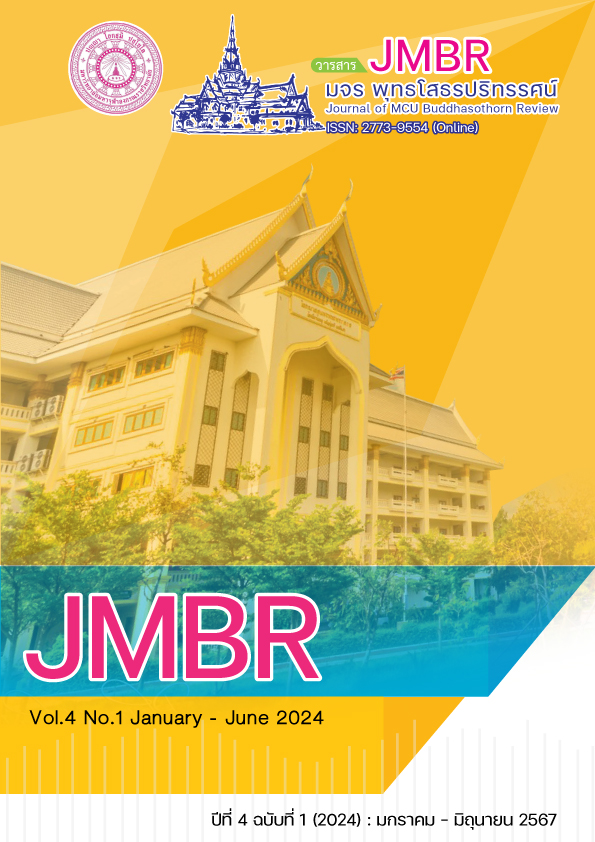Leadership of School Administrators and Curriculum and Teaching Development
Main Article Content
Abstract
This academic article aims to study the leadership of school administrators and the development of curriculum and teaching. The leadership of educational institution administrators consists of the characteristics of school administrators, the behavior of school administrators, the situation of school administrators, the role of school administrators, and the emotional intelligence of school administrators.
Then they were interested in the leadership, because the success of educational institutions depends on the leadership of educational institution administrators and the context of the educational institution. And it is necessary to perform the duties consistent with the educational institution administrator position with quality. It depends on the changes and context of the educational institution. The role of educational institution administrators includes planners, group representatives, and academic leaders, including the relationships within the group and assessors.
In this study, it was concluded that the academic leaders of educational institution administrators are an important key-person in performing their duties to ensure the educational institutions to have quality and standards, consisting of: the educational institution curriculum development, the learning process development, the measurement, the evaluation, and transfer learning units.
Moreover, there are the research to improve the educational quality development, the innovative media, the educational technology, the learning resources, the educational supervision, the educational guidance, the quality assurance systems in an educational institutions Promoting academic knowledge to the community Coordinating cooperation in academic development with other educational institutions, the promoting and supporting academic work for some individuals, families, organizations, agencies, and other institutions providing the education.
In this regard, developing the curriculum and teaching of educational institutions is a necessary type and an important task in developing academic work to keep up with the times. Therefore, the leadership of school administrators and the development of curriculum and teaching is more important to organize the education that made of the quality, the educational standards and create the greatest benefit to educational institutions and the country.
Then they were interested in the leadership, because the success of educational institutions depends on the leadership of educational institution administrators and the context of the educational institution. And it is necessary to perform the duties consistent with the educational institution administrator position with quality. It depends on the changes and context of the educational institution. The role of educational institution administrators includes planners, group representatives, and academic leaders, including the relationships within the group and assessors.
In this study, it was concluded that the academic leaders of educational institution administrators are an important key-person in performing their duties to ensure the educational institutions to have quality and standards, consisting of: the educational institution curriculum development, the learning process development, the measurement, the evaluation, and transfer learning units.
Moreover, there are the research to improve the educational quality development, the innovative media, the educational technology, the learning resources, the educational supervision, the educational guidance, the quality assurance systems in an educational institutions Promoting academic knowledge to the community Coordinating cooperation in academic development with other educational institutions, the promoting and supporting academic work for some individuals, families, organizations, agencies, and other institutions providing the education.
In this regard, developing the curriculum and teaching of educational institutions is a necessary type and an important task in developing academic work to keep up with the times. Therefore, the leadership of school administrators and the development of curriculum and teaching is more important to organize the education that made of the quality, the educational standards and create the greatest benefit to educational institutions and the country.
Article Details

This work is licensed under a Creative Commons Attribution-NonCommercial-NoDerivatives 4.0 International License.
ต้นฉบับที่ได้รับการตีพิมพ์ในวารสาร มจร พุทธโสธรปริทรรศน์ วิทยาลัยสงฆ์พุทธโสธร มหาวิทยาลัยมหาจุฬาลงกรณราชวิทยาลัย ถือเป็นกรรมสิทธิ์ของวิทยาลัยสงฆ์พุทธโสธร มหาวิทยาลัยมหาจุฬาลงกรณราชวิทยาลัย ห้ามนำข้อความทั้งหมดหรือบางส่วนไปพิมพ์ซ้ำ เว้นเสีย แต่ว่าจะได้รับอนุญาตจากวิทยาลัยฯ เป็นลายลักษณ์อักษร และเพื่อให้เป็นไปตามกฎหมายลิขสิทธิ์ ผู้เขียนทุกท่านต้องลงลายมือชื่อในแบบฟอร์มใบมอบลิขสิทธิ์ บทความให้แก่วารสาร พร้อมกับบทความต้นฉบับที่ได้แก้ไขครั้งสุดท้าย นอกจากนี้ ผู้เขียนทุกท่านต้องยืนยันว่าบทความต้นฉบับที่ส่งมาตีพิมพ์นั้น ได้ส่งมาตีพิมพ์เฉพาะในวารสาร มจร พุทธโสธรปริทรรศน์ เพียงแห่งเดียวเท่านั้น
References
กระทรวงศึกษาธิการ. (2546). พระราชบัญญัติการศึกษาแห่งชาติ พ.ศ. 2542 และที่แก้ไขเพิ่มเติม (ฉบับที่ 2) พ.ศ. 2545. กรุงเทพฯ: โรงพิมพ์องค์การรับส่งสินค้าและพัสดุภัณฑ์.
กระทรวงศึกษาธิการ. (2553). หลักสูตรแกนกลางการศึกษาขั้นพื้นฐาน พุทธศักราช 2551. กรุงเทพฯ: โรงพิมพ์ชุมชนการเกษตรแห่งประเทศไทย. กระทรวงศึกษาธิการ.
เกรียงศักดิ์ เจริญวงศ์ศักดิ์. (2546). ภาพอนาคตและคุณลักษณะของคนไทยที่พึงประสงค์. กรุงเทพฯ: สำนักงานคณะกรรมการการศึกษาแห่งชาติ.
ณิชาภา ธพิพัฒน์. (2559). การพัฒนารูปแบบความสัมพันธ์เชิงสาเหตุของปัจจัยที่ส่งผลต่อภาวะผู้นำผู้บริหารสถานศึกษาระดับมัธยมศึกษา สังกัดสำนักงานคณะกรรมการการศึกษาขั้นพื้นฐาน (วิทยานิพนธ์ปริญญาครุศาสตรดุษฎีบัณฑิต วิชาการบริหารการศึกษา). มหาวิทยาลัยราชภัฏวไลยอลงกรณ์ ในพระบรมราชูปถัมภ์ จังหวัดปทุมธานี.
ทวน เที่ยงเจริญ. (2563). การพัฒนาระบบการบริหารสถานศึกษาเพื่อความเป็นเลิศของสถานศึกษา สังกัดสำนักงานเขตพื้นที่การศึกษามัธยมศึกษา (วิทยานิพนธ์ปริญญาครุศาสตรดุษฎีบัณฑิต วิชาการบริหารการศึกษา). มหาวิทยาลัยราชภัฏวไลยอลงกรณ์ ในพระบรมราชูปถัมภ์ จังหวัดปทุมธานี.
ปานหทัย ธรรมรัตน์. (2564). ความสัมพันธ์ระหว่างภาวะผู้นำทางวิชาการของผู้บริหารสถานศึกษากับการเป็นชุมชนแห่งการเรียนรู้ทางวิชาการของโรงเรียน สังกัดสำนักงานเขตพื้นที่การศึกษาสกลนคร เขต 2 (วิทยานิพนธ์ปริญญาครุศาสตรมหาบัณฑิต สาขาวิชาการบริหารการศึกษา). บัณฑิตวิทยาลัย: มหาวิทยาลัยราชภัฏสกลนคร.
พรรณพรรษ หัตถวงษ์. (2562). รูปแบบการบริหารสถานศึกษาตามหลักการบริหารโดยใช้โรงเรียนเป็นฐาน ในการพัฒนาท้องถิ่น สังกัดองค์กรปกครองส่วนท้องถิ่น (ปรัชญาดุษฎีบัณฑิต วิชาการบริหารการศึกษา). คณะศึกษาศาสตร์ มหาวิทยาลัยบูรพา.
ไพฑูรย์ สินลารัตน์. (2561). หลักการคิดการจัดการหลักสูตรและการสอน. พิมพ์ครั้งที่ 4. กรุงเทพฯ: จุฬาลงกรณ์มหาวิทยาลัย.
ภัทรินญา เดชาวัตธนโชติ. (2563). แนวทางการพัฒนาสมรรถนะผู้บริหารสถานศึกษา สังกัดสำนักงานเขตพื้นที่การศึกษามัธยมศึกษา เขต 35 (ครุศาสตรดุษฎีบัณฑิต วิชากการบริหารการศึกษา). บัณฑิตวิทยาลัย: มหาวิทยาลัยราชภัฏเชียงราย.
ราชกิจจานุเบกษา. (2556). กฎหมายวาด้วยระบบ หลักเกณฑ์ และวิธีการประกันคุณภาพการศึกษา. 127(23ก.).
สำนักงานเลขาธิการคุรุสภา. (2548). มาตรฐานวิชาชีพทางการศึกษา. กรุงเทพฯ: สำนักงานเลขาธิการคุรุสภา.
สำนักงานคณะกรรมการการศึกษาแห่งชาติ. (2549). แนวทางการวัดผลประเมินผลในชั้นเรียน กลุ่มสาระวิทยาศาสตร์ หลักสูตรการศึกษาขั้นพื้นฐาน พุทธศักราช 2544. กรุงเทพฯ: โรงพิมพ์องค์การรับส่งสินค้าและพัสดุภัณฑ์ (ร.ส.พ.).
เวียงชัย วัชรนิรันดร์. (2553). ผู้บริหารมืออาชีพ. สืบค้นเมื่อวัที่ 25 มกราคม 2567, จากhttp://www.gotoknow.org.
สำนักงานเลขาธิการสภาการศึกษา. (2563). ข้อเสนอเชิงนโยบายเกี่ยวกับการพัฒนาคุณภาพการศึกษาเชิงระบบ. กรุงเทพฯ: สำนักพัฒนากฎหมายการศึกษา สำนักงานเลขาธิการสภาการศึกษา กระทรวงศึกษาธิการ.
สำนักนายกรัฐมนตรี. (2565). แผนพัฒนาเศรษฐกิจและสังคมแห่งชาติฉบับที่สิบสาม พ.ศ. 2566-2570. สำนักงานสภาพัฒนาการเศรษฐกิจและสังคมแห่งชาติ.
อัจฉรา ช่วยนุ่ม. (2560). รูปแบบปัจจัยเชิงสาเหตุของการบริหารสถานศึกษาที่ส่งผลต่อประสิทธิผลของสถานศึกษาที่มุ่งสู่ความเป็นเลิศ (วิทยานิพนธ์ศึกษาศาสตรดุษฎีบัณฑิต สาขาวิชาการบริหารการศึกษา). บัณฑิตวิทยาลัย: มหาวิทยาลัยเกษตรศาสตร์.
Good, C.V. (Ed). (1973). Dictionary of education: Prepared under the auspices of Phi Delta Kappa. 3rd ed. New York: Ma Graw-Hill
Knezevich, S. J. (1984). Administration of Public Education. 4th ed. New York: Harpar and Row.
Krech, Crutchfield, & Ballachey. (1962). Individual in Society. New York: McGraw-Hill.
Mintzberg. (1980). The Nature of Managerial Work. New York: Prentice Hall Inc.
Murphy. (1996). Making ethical decision systematically. Nursing, 76(6), 137-147.
Stogdill, Ralph M. (1974). Handbook of Leadership. New York: Free Press.
Taba, Hilda. (1962). Saylor and Alexander. (1974). Curriculum Development: Theory and Practice. New York: Harcourt Brace and World.


